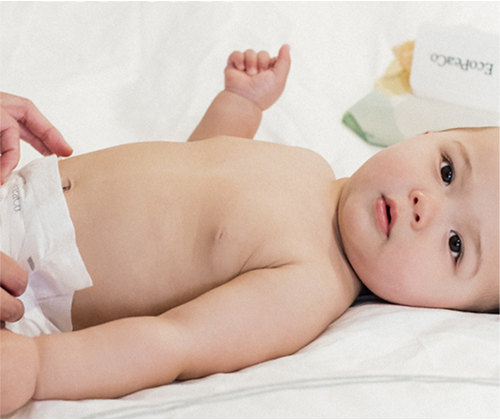Did you know that the seemingly innocuous decisions you make as a parent can have a significant impact on the environment? With so many products on the market boasting various labels and certifications, navigating the baby care aisle can feel like entering a maze. Understanding the significance of labels like Biobased products and Leaping Bunny certification can empower you to make informed choices that prioritize your family's well-being and the planet's health. As a company, we are focused on transparency, and it’s important to us that you understand what the labels we highlight on our products mean. Let’s celebrate National Biobased Products Day, happening March 8, and explore more about biobased products and how they can support your family.
What Are Biobased Products?
Biobased products represent a shift towards sustainability by deriving their primary ingredients from renewable biological resources. Unlike traditional petroleum-based products, which rely on finite fossil fuels, biobased alternatives harness the power of nature's bounty. These products encompass a diverse range of items, spanning from household cleaners and personal care products to clothing and packaging materials.
Benefits of Biobased Products
Biobased products, certified by the USDA, offer many benefits that align perfectly with the needs of conscientious parents. From reducing carbon footprints to promoting a healthier environment, the advantages of opting for biobased alternatives extend far beyond the nursery. Let’s look at some of the benefits that make biobased products a smart choice for your family.
- Reduced carbon footprint: Imagine this – every time you change your baby’s diaper or give them a bath using biobased products, you’re not just caring for your little one; you’re also contributing to a greener planet. By opting for biobased diapers, made from materials like bamboo, you’re reducing your carbon footprint and helping to mitigate climate change. It’s a small change that can make a big difference in the long run.
- Gentle for your family: Parenting comes with its fair share of worries, but with biobased products, you can rest a little easier. Take biobased baby wipes for example. Made from gentle, plant-based materials like bamboo, these wipes are free from harsh chemicals and are biodegradable, ensuring they are gentle on your baby’s delicate skin and the environment. It’s peace of mind in every wipe.
- Promotes innovation and investment: As parents, we all want what’s best for our children’s future. By supporting biobased industries, you’re not just investing in gentler, more sustainable products for your family – you’re also paving the way for a brighter tomorrow. Your choices today contribute to developing innovative technologies and sustainable practices that will benefit future generations.

Are Biobased Products Sustainable?
Biobased products offer a sustainable solution to the environmental challenges posed by traditional petroleum-based products. Unlike their counterparts, which rely on finite fossil fuels and contribute to greenhouse gas emissions, biobased products are derived from renewable biological resources. This means that their production is inherently more sustainable, as it reduces reliance on non-renewable resources and helps mitigate climate change.
However, the sustainability of biobased products extends beyond their renewable origins. These products often have lower carbon footprints compared to petroleum-based alternatives, thanks to the carbon sequestration process of the plants from which they are derived. Additionally, biobased materials can be biodegradable or compostable, further reducing their environmental impact at the end of their lifecycle.
While it's true that some biobased products may have environmental drawbacks depending on their cultivation and production methods, the overall sustainability benefits are significant. By choosing biobased alternatives, consumers can actively contribute to a more sustainable future by reducing carbon emissions, minimizing waste, and supporting renewable resources.
Top Biobased Materials
Several materials stand out as champions of sustainability within the bio-based industry. These natural materials are revered for their versatility, renewability, and minimal environmental impact. From soft fabrics to durable packaging, these top biobased materials offer a myriad of benefits for both your family and the environment.
- Bamboo: Renowned for its rapid growth and minimal environmental footprint, bamboo is a versatile material used in baby clothing, diapers, and wipes. Its natural hypoallergenic properties make it an ideal choice for babies with sensitive skin, providing comfort and protection with every use.
- PLA (Polylactic Acid): Derived from corn starch or sugarcane, PLA is a biodegradable polymer used in packaging materials, disposable utensils, and even baby bottles. Choosing PLA-based products ensures that your baby’s feeding essentials are free from harmful chemicals and contribute to reducing plastic waste in the environment.
- Hemp: Hemp is a versatile and sustainable material that can be used in a variety of baby products, including clothing, blankets, and toys. Its soft and breathable texture makes it perfect for baby apparel, while its durability ensures that it withstands the wear and tear of daily use. Additionally, hemp cultivation requires minimal water and pesticides, making it an eco-friendly choice for conscientious parents.
- Cork: Harvested from the bark of cork oak trees, cork is a lightweight, durable, and water-resistant material that’s perfect for baby products like toys, teethers, and bottle stoppers. Its natural antimicrobial properties make it ideal for keeping your baby’s toys clean while its renewable nature ensures that forests are preserved for future generations to enjoy.
Examples of Biobased Products
Parenting is one of the quickest ways to realize the sheer number of products in your daily routine. From changing diapers to bathing your little one, these moments offer a chance to support your baby while also making a positive impact on the world they’ll grow up in. By purchasing biobased alternatives, you can turn everyday products into opportunities to promote sustainability and care. Here are some traditional products that have great biobased alternatives for your lifestyle:
- Diapers: Biobased diapers, crafted from materials like bamboo, offer a greener alternative for diapering your little one. They are gentle on delicate skin, often hypoallergenic, and contribute to reducing environmental impact.
- Baby wipes: Made from materials like bamboo, biobased baby wipes offer a gentle and eco-friendly alternative for diaper changes and general cleanup. They are free from harsh chemicals and are biodegradable, making them good for your baby and the environment.
- Bath products: Formulated with natural ingredients derived from plants or fruits, biobased shampoo, and body wash offer a gentle and nourishing cleansing experience for your baby’s delicate skin. They are free from synthetic fragrances, parabens, and sulfates, ensuring a gentle and soothing bath time routine.
Key Insights
Biobased products offer a sustainable choice for conscientious parents seeking gentle and eco-friendly alternatives for their families. By understanding their significance, exploring examples and materials, and considering their benefits and sustainability, you can make informed decisions that align with your values as a caring and responsible parent. At EcoPeaCo., we're committed to supporting you on your parenting journey, providing transparency and guidance to help you make the best choices for your family's well-being and the planet's health.
Shop EcoPeaCo’s biobased products

